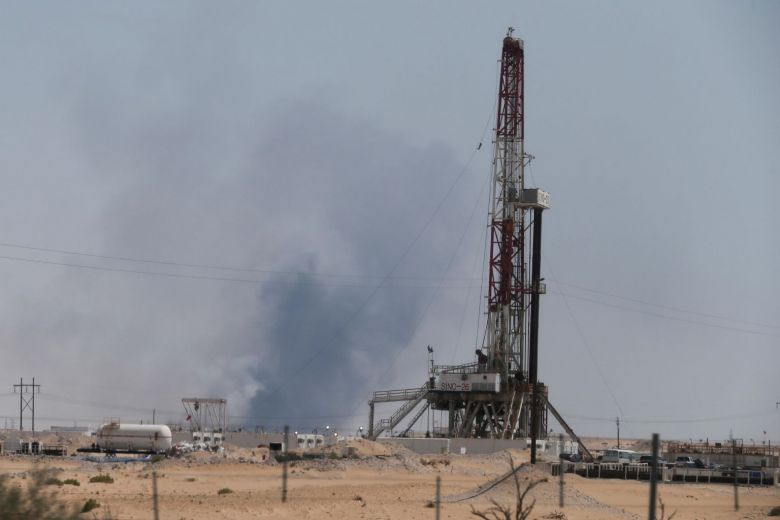When Yemeni rebels claimed responsibility for drone attacks on Saudi oil pumping stations and a pipeline four months ago, the Houthi movement warned that it was capable of much bigger attacks on the world’s top oil exporter.
This weekend the Houthis — a battle-hardened Islamist movement aligned to Iran — claimed to have delivered on that threat to devastating effect.
The group said it dispatched 10 drones to strike at the heart of Saudi Arabia’s oil industry, hitting Abqaiq, the kingdom’s biggest oil processing centre, and Khurais oilfield, more than 500 kms from the Yemeni border.
It was an audacious assault that forced the kingdom to suspend more than half its daily production and sent shudders through the global energy industry.
And it will reignite fears about the threat of a regional conflagration between the US, its Arab allies and Iran.
“It’s very serious. It shows better Houthi targeting capabilities, it shows they are thinking strategically, hitting two targets at the same time, and hurting what is most important to Saudi Arabia — it’s reliable infrastructure for oil exports,” said Emile Hokayem, a Middle East security expert at the International Institute for Strategic Studies.
“The Houthis have their own reasons to attack, but Iran is the likely complicit second beneficiary.”
The Houthis have been battling a Saudi-led Arab coalition that intervened in Yemen’s civil war in March 2015 after the rebels seized the capital, Sana’a. But they have long been considered by Washington and Riyadh to be Iranian proxies stoking conflict on Saudi Arabia’s doorstep.
Since the Trump administration ramped up its “maximum pressure” strategy on Iran in April, many analysts and diplomats have warned that Tehran could respond indirectly through regional militant groups. It is a tactic, they say, that gives Tehran plausible deniability and has the advantage of keeping potential flashpoints outside of the republic’s borders.
Iran, which supports militias in Syria, Iraq, Lebanon and Yemen, has repeatedly warned that if US sanctions prevent it exporting oil then it will disrupt the flow of crude and petrochemicals throughout the region.
The message from Tehran has been clear: the US’s Arab allies, notably Saudi Arabia and the United Arab Emirates, will also bear a cost for the Trump administration’s hostility towards the republic.
In May and June, six tankers were sabotaged off the coast of the UAE attacks that the US blamed on Iran but which it denied. In recent months, the Houthis, who control northern Yemen, bordering Saudi Arabia, have stepped up missile and drone assaults into the kingdom.
Saudi defence systems often destroy incoming missiles, but drones have become an increasing threat.
Washington and Riyadh have accused Tehran of smuggling weapons, including sophisticated missiles, to the Houthis, which Iran denies. And Mike Pompeo, US secretary of state, this weekend blamed Iran for the “unprecedented attack on the world’s energy supply”. He added that there was “no evidence the attacks came from Yemen”.
He did not provide any details. But US officials have previously cast doubt on whether the Houthis were responsible for the May pipeline attack, saying at least one of those drones came from Iraq, where Iran backs Shia militias. Baghdad on Sunday denied that its territory was used for this weekend’s attacks.
Tehran’s relationship with the Houthis is more opportunistic than ideological, analysts say and Iran’s foreign ministry on Sunday dismissed any role in the weekend’s oil strikes, accusing Washington of “maximum lies”.
In recent months, however, the regime has been more open about its support to the Yemeni rebels. The Houth is last month said they were appointing an ambassador to Tehran and the envoy was pictured with Ayatollah Ali Khamenei, Iran’s supreme leader.
This year, Hossein Sheikholeslam, a former senior diplomat close to Iran’s hardliners, told the Financial Times that Iran was not sending missiles to Yemen, before adding: “If you think that this expertise that exists in Yemen came from Iran, you’re right.”
Hours after Saturday’s attacks on the Saudi oil facilities, Qasem Soleimani, the powerful commander of the Quds force, the overseas arm of Iran’s Revolutionary Guards, posted a video in which he used religious imagery to praise the Houthis as part of the Islamic republic’s “expanding” network of followers.
Iran’s Fars news agency, which is close to the guards, on Sunday described the attack on the oil facilities was “very smart and timely”. The agency said the assaults would scare off foreign investors as Crown Prince Mohammed bin Salman, the kingdom’s de facto leader, accelerates plans to launch an initial public offering of Saudi Aramco, the state oil company.
Saudi Arabia has so far not apportioned blame for the weekend’s attacks. Saudi officials have said that while the kingdom supports the US maximum pressure strategy it wants to avoid a broader conflict with Iran.
Prince Mohammed told Mr Trump on Saturday that the kingdom “has the resolve and capability to confront this terrorist attack and deal with it,” according to the state news agency.
Riyadh typically responds to Houthi attacks in the kingdom by launching air strikes against rebel-controlled areas in Yemen. But after four years of bombardment, the Houthis retain their grip over Yemen’s populous north.
And the strikes on the oil facilities could raise fresh questions about Mr Trump’s ultimate goal with his “maximum pressure” strategy. “A lack of US response could unnerve regional partners and that’s where you may see a split if people in Riyadh and Abu Dhabi and elsewhere think the Americans are not willing to exact a price,” said Mr Hokayem.
A Saudi analyst said the strikes should act as a wake-up call for the international community. “This will show that what the kingdom has been saying is right and the Houthis are just a puppet of Iran,” the analyst said. “People will start to understand when they see the oil price increasingly dramatically
